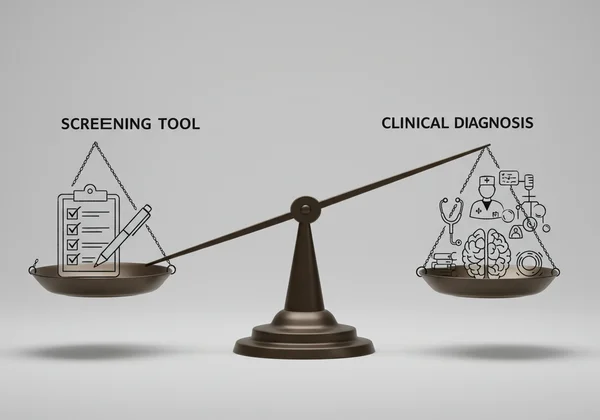Your AQ Score: What It Means & How to Interpret Results
July 13, 2025 | By Eliza Finch
Just received your AQ score and wondering what it all means? The journey of self-discovery, especially understanding our unique traits, is a truly enlightening one. This comprehensive guide is here to help you decode your Autism Quotient results, providing clarity on different score ranges and what they might suggest about your unique traits. Remember, the AQ test is a valuable self-screening tool, not a diagnostic one – it's a stepping stone on your path to self-understanding. You can always take the free online AQ test or explore more insights on our platform.
Understanding Your AQ Score Meaning: The Basics
Before diving into interpretations, let's establish a foundational understanding of the Autism Quotient test itself. Knowing what it measures and how it was developed helps contextualize your results.
What is the AQ Test and What Does It Measure?
The AQ test (Autism Quotient test) is a widely recognized self-report questionnaire developed by Professor Simon Baron-Cohen and his team at the Cambridge University Autism Research Centre. Its primary purpose is to assess the degree to which an adult possesses traits associated with the autism spectrum. It's not a diagnostic instrument, but rather a screening tool that helps individuals and professionals identify potential areas of autistic traits in the general population.
The autism quotient measures a range of characteristics often seen in individuals on the autism spectrum, such as social skills, communication style, imagination, attention to detail, and attention switching. By answering 50 simple questions about your typical behaviors and experiences, the test provides a numerical score that reflects your propensity for these traits. Taking a free AQ test is a simple first step in this process.

The Five Dimensions of the Autism Quotient
The 50 questions of the AQ test are carefully designed to explore five key areas, offering a nuanced view of various autistic traits:
- Social Skills: This dimension assesses your ease and comfort in social interactions, including understanding social cues, making friends, and participating in group activities.
- Attention Switching: This measures how easily you can shift your focus from one task or conversation to another, and your flexibility in adapting to new situations.
- Attention to Detail: This focuses on your tendency to notice small details, your precision, and your preference for structured, methodical approaches.
- Communication: This explores aspects of your verbal and non-verbal communication, including your ability to express yourself and interpret others' intentions.
- Imagination: This assesses your capacity for creative thinking, pretend play (in childhood), and your ability to engage with abstract concepts or novel ideas.
Understanding these five dimensions can help you appreciate the depth of insights the AQ test provides beyond just a single number.

Interpreting AQ Test Results: High, Average, and What They Indicate
Once you've completed the 50 questions, you receive an AQ score ranging from 0 to 50. What does this score tell you? Let's explore the typical ranges and their implications.
What is a Typical or Average AQ Score?
For the general population, a normal or average AQ score typically falls around 16-17. This range suggests a predominantly neurotypical cognitive style, meaning your behavioral and cognitive patterns largely align with what is considered typical in society. It indicates that you likely do not exhibit a high number of autistic traits measured by the questionnaire. However, it's important to remember that human variation is vast, and even within the "average" range, individuals possess diverse strengths and challenges. This average score offers a baseline against which other scores can be considered.
Decoding a Higher AQ Score: Exploring Autistic Traits
A higher AQ test score meaning generally indicates a greater number of autistic traits. While there's no single "cutoff" for diagnosis, scores of 32 or higher are often considered significant and may suggest that an individual possesses a substantial number of characteristics associated with the autism spectrum. For instance, if your score from an online autism screening is in this range, it suggests that you may experience the world differently in areas like social interaction, sensory processing, and patterns of thinking.
It's crucial to reiterate: a high AQ score is not a diagnosis of autism. Instead, it's an indicator that further exploration might be beneficial. Many individuals with higher scores choose to delve deeper into autism spectrum traits to better understand themselves. This can lead to greater self-awareness, improved self-advocacy, and finding strategies that work best for their unique cognitive style. The AI personalized report offered on our platform can provide these deeper insights, translating your score into actionable advice. If you're ready to explore your score, consider starting your AQ test journey today.

Lower Scores: Understanding Neurotypical Traits and Variance
Scores in the lower ranges (e.g., below 20) typically suggest fewer self-reported autistic traits and a greater alignment with neurotypical traits. Individuals with lower scores usually navigate social complexities with relative ease, adapt flexibly to new situations, and tend not to focus intensely on minute details in the same way someone with a higher AQ score might.
However, a lower score doesn't mean you have no autistic traits at all, nor does it imply a lack of individuality. It simply indicates that, according to the questionnaire, your profile leans more towards neurotypical patterns. Everyone is unique, and this test highlights specific aspects of your cognitive and behavioral preferences.
Beyond the Number: Important Considerations for Your AQ Test Results Meaning
Your AQ score is just one piece of a much larger puzzle. It's a valuable starting point for self-reflection but should be understood within its limitations.
The AQ Test: A Screening Tool, Not a Clinical Diagnosis
This cannot be stressed enough: the AQ test is a screening tool, not a clinical diagnosis. It is designed to identify traits and indicate whether a formal assessment might be worthwhile. The difference between the AQ test and a clinical diagnosis is profound. A diagnosis of autism spectrum disorder can only be made by a qualified healthcare professional, such as a psychologist, psychiatrist, or neurologist, after a comprehensive evaluation. This evaluation typically involves multiple assessments, interviews, and observations over time.
If your AQ score leads you to consider professional consultation, please remember that this test provides information for self-understanding, not a medical conclusion. It’s always best to consult with a medical professional for any health concerns.

Factors That Can Influence Your Score
Several factors that can influence your score on the AQ test exist. Your current mood, how you interpret the questions, your level of self-awareness, and even cultural background can subtly affect your responses. The test relies on self-report, which means your answers reflect your perception of yourself. It's not uncommon for scores to vary slightly if you take the test at different times or if your understanding of certain questions evolves. The goal is honesty, not achieving a particular score.
Embracing Self-Discovery and Next Steps
No matter your score, the autism spectrum quotient AQ test can be a powerful catalyst for self-discovery. It provides a framework to understand aspects of your personality, your strengths, and potential challenges. If your score resonates with you, it might explain lifelong experiences or subtle differences you’ve always felt.
What should I do after getting my AQ score? If you're curious to dive deeper, our website offers a unique feature: an AI-generated personalized analysis report. By answering a few extra background questions, this report goes beyond the number, offering insights into your unique traits, potential advantages, areas for growth, and actionable advice. It’s a fantastic way to explore your results in a meaningful context. You can also explore other resources on our site that discuss various aspects of neurodiversity.
Empowering Your Journey of Self-Understanding
Your AQ score is a data point on your personal map, not a definitive label. It's an invitation to understand yourself more deeply, to celebrate your unique cognitive style, and to navigate the world with greater self-awareness. Whether you are a self-explorer curious about your inner world or a professional seeking preliminary information, the AQ test provides valuable insights.
On our website, we are committed to providing a free, scientific, and immediate online AQ test experience. Our unique AI-generated personalized reports empower you with insights that go beyond a simple number, offering valuable perspectives on your distinct traits, strengths, and areas for growth.
Take the next step in your journey of self-understanding. Visit our site today to take your free AQ test and unlock your personalized insights. Embrace your unique mind!
Frequently Asked Questions About AQ Scores
What does a high AQ test score mean?
A high AQ score suggests that you possess a significant number of traits commonly associated with the autism spectrum. It indicates a cognitive and behavioral profile that diverges from the neurotypical average. This is not a diagnosis but a strong indicator for further self-exploration or professional consultation if you wish to pursue it.
Is the AQ test a diagnosis for autism?
No, absolutely not. The AQ test is a self-assessment screening tool. It helps identify the presence of autistic traits but cannot, and should not, be used as a substitute for a formal clinical diagnosis of autism spectrum disorder, which must be conducted by a qualified healthcare professional.
What is a normal or average AQ score?
A normal or average AQ score for individuals in the general population typically falls in the range of 16-17 out of a possible 50. Scores significantly above or below this average may indicate a stronger presence or absence of autistic traits, respectively.
How accurate is the AQ test?
The AQ test is a scientifically validated and widely used screening tool. It has demonstrated good reliability and validity in identifying autistic traits in adults. However, its accuracy lies in its function as a screening tool. It is accurate for indicating a tendency towards autistic traits, but not for providing a definitive diagnosis, as it relies on self-report and cannot capture the full complexity of an individual's profile.
What should I do after getting my AQ score?
After getting your AQ score, you have several options. Many people choose to explore the personalized AI analysis report available on our site, which offers deeper insights into their specific traits, strengths, and potential challenges. You might also consider reflecting on how your score resonates with your life experiences. If you have significant concerns, consulting a healthcare professional for a comprehensive evaluation is always recommended.